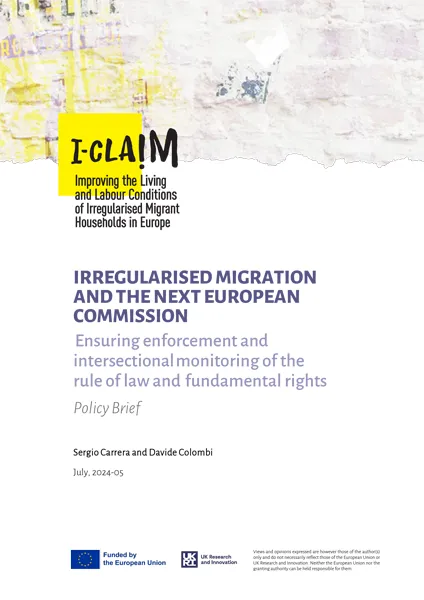Irregularised migration and the next European Commission.
Sergio Carrera and Davide Colombi
How to cite:
Carrera, S., Colombi, D. Irregularised migration and the next European Commission.Ensuring enforcement and intersectional monitoring of the rule of law and fundamental rights. Policy Brief. I-CLAIM.
Irregularised migration and the next European Commission.
Sergio Carrera and Davide Colombi
This CEPS Policy Brief shows that a home affairs and criminalisation approach prioritising law enforcement and policing has dominated the von der Leyen (VDL) Commission (2019-24) on questions related to migration policy. This policy approach conflicts with human dignity and other legitimate public policy perspectives, such as employment and social inclusion non-discrimination, where the individual’s migration status isn’t the determining factor. It also conflicts with EU Treaty values which emphasise the obligation to uphold the rule of law and guarantee access to effective justice for every individual.
Some human mobilities are uncritically understood as an insecurity problem within EU migration policies. This includes what does and does not constitute ‘migration’, who is a ‘migrant’, who is an ‘irregular immigrant’, and who isn’t. Special focus is given to individuals from certain countries and regions where asylum seekers come from or to communities who are structurally discriminated against due to their origins (like the Roma). This calls into question the Commission’s compliance with its own EU Anti-Racism Action Plan 2020-2025, which requires it to address institutionalised discrimination. Current EU policies fall short of upholding decent working conditions for all workers.
The overriding policy priority driving EU migration policy has been expelling irregularised third country nationals (TCNs) at all costs. The EU’s home affairs and criminalisation approach is a direct product of the intergovernmental origins of European cooperation on restricting free movement inside the Schengen area. These policies have played a key role in pushing people with legitimate mobility and asylum claims into irregularised status. It pursues a law-enforcement logic which reduces individuals to deportable or expellable subjects without any agency and rights.
The structure of the VDL Commission has deepened a top-down or ‘control and command’ approach that aims to ensure the political alignment of all Commission initiatives in these domains. Unlike the previous Commission, the Vice-President responsible for ‘EU values’ has not supervised and coordinated all the Commission’s work. This has blurred the Treaties’ call for EU values in Article 2 TEU to take priority over the home affairs agenda.
Instead, the Commission has given precedence to the restrictive priorities of some EU Member States, reinjecting intergovernmentalism into an area where the EU has consolidated competencies. Thus, the VDL Commission has not effectively fulfilled its role as ‘Guardian of the Treaties’, meaning that it hasn’t effectively enforced EU Treaty values and fulfilled the Better Regulation commitments in EU migration policies.
This Policy Brief has three core recommendations:
(I) A comprehensive review of the Commission’s internal organisation and structures to ensure effective and impartial monitoring and enforcement, compliance with EU rule of law values and the upholding of EU Better Regulation commitments;
(II) actively enforcing the EU’s Charter of Fundamental Rights and existing instruments granting non- discriminatory access to socio-economic rights to irregularised persons in the areas of employment and social inclusion; and
(III) upholding and promoting international labour standards and decent work rights across EU legislation and policy for all workers regardless of their migration status, both in employment and regular migration policies.
Policy Brief. Irregularised migration and the next European Commission
Methodology
This Policy Brief falls within the scope of the EU-funded I-CLAIM project which examines the living and labour conditions of irregularised households in Europe. It’s based on the I-CLAIM report ‘The Legal and Policy Infrastructures of Irregular Migration in the EU’ (Carrera & Colombi, forthcoming, SpringerBrief in Law).
The research findings and policy recommendations also draw on a discussion held at the closed-door I- CLAIM EU stakeholders meeting, which took place on 18 April 2024 and was co-organised by the Centre for European Policy Studies (CEPS), the European Trade Union Confederation (ETUC) and the European Network Against Racism (ENAR). The meeting brought together officials from the EU institutions, international organisations, civil society organisations, social partners and employers’ organisations.
